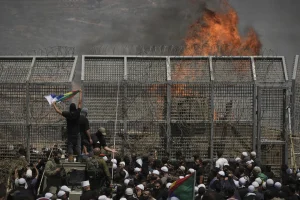Syrian government officials and leaders in the Druze religious minority announced a renewed ceasefire Wednesday after days of clashes that have threatened to unravel the country’s postwar political transition and drawn military intervention by powerful neighbor Israel.
Convoys of government forces began withdrawing from the city of Sweida, but it was not immediately clear if the agreement, announced by Syria’s Interior Ministry and in a video message by a Druze religious leader, would hold. A previous ceasefire announced Tuesday quickly fell apart, and a prominent Druze leader, Sheikh Hikmat Al-Hijri, disavowed the new agreement, says AP.
The announcement came after Israel launched rare airstrikes in the heart of Damascus, an escalation in a campaign that it said was intended to defend the Druze and push Islamic militants away from its border. The Druze form a substantial community in Israel as well as in Syria and are seen in Israel as a loyal minority, often serving in the military.
Israel has launched dozens of strikes targeting government troops and convoys heading into Sweida, and on Wednesday struck the Syrian Defence Ministry headquarters next to a busy square in Damascus that became a gathering point after Assad’s fall.
That strike killed three people and injured 34, Syrian officials said. Another Israeli strike hit near the presidential palace in the hills outside Damascus.
The escalation in Syria began with tit-for-tat kidnappings and attacks between local Sunni Bedouin tribes and Druze armed factions in the southern province of Sweida. Government forces that intervened to restore order clashed with the Druze militias, but also in some cases attacked civilians.

The violence appeared to be the most serious threat yet to efforts by Syria’s new rulers to consolidate control of the country after a rebel offensive led by Islamist insurgent groups ousted longtime despotic leader Bashar Assad in December, ending a nearly 14-year civil war.
No official casualty figures have been released for the latest fighting since Monday, when the Interior Ministry said 30 people had been killed. The UK-based war monitor Syrian Observatory for Human Rights said more than 300 people had been killed as of Wednesday morning, including four children, eight women and 165 soldiers and security forces.
Israel has taken an aggressive stance toward Syria’s new leaders, saying it does not want Islamist militants near its borders. Israeli forces have seized an UN-patrolled buffer zone on Syrian territory along the border with the Golan Heights and launched hundreds of airstrikes on military sites in Syria.
Syria’s Defence Ministry had earlier blamed militias in the Druze-majority area of Sweida for violating the ceasefire agreement reached Tuesday.
Reports of attacks on civilians continued to surface, and Druze with family members in the conflict zone searched desperately for information about their fate amid communication blackouts.
The Druze religious sect began as a 10th-century offshoot of Ismailism, a branch of Shiite Islam. More than half of the roughly 1 million Druze worldwide live in Syria. Most of the other Druze live in Lebanon and Israel, including in the Golan Heights, which Israel captured from Syria in the 1967 Mideast War and annexed in 1981.
Interim President Ahmad al-Sharaa issued a statement Wednesday condemning the violations and vowing that perpetrators would be punished. “These criminal and illegal actions cannot be accepted under any circumstances, and completely contradicts the principles that the Syrian state is built on,” the statement read.


